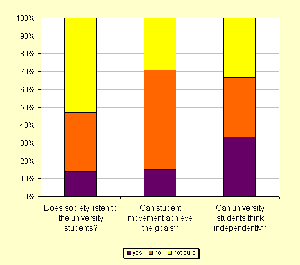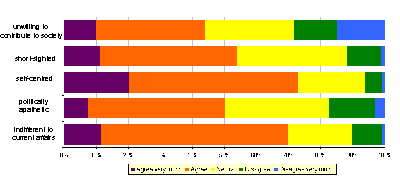Periscope |
Home | Archives | About | Media Links
October 1999
Silence is Golden
By Grace Cheng
See also:
The Cream
Churns
Prof. Wu
Chia-wei: "Don't play to gallery"
A survey done in June on how
university students think of themselves found that while most of
them agreed that the aims of the student movements were
meaningful, most respondents were doubtful and
uncertain about their effectiveness, let alone taking part in
those movements.
most respondents were doubtful and
uncertain about their effectiveness, let alone taking part in
those movements.
Professor Chan Kin Man of the Department of Sociology of The Chinese University of Hong Kong analyses this phenomenon from three perspectives.
"In the '60s and '70s, there were few political and social organisation to uphold justice. Therefore, student movements took up the special role of these pressure groups.
"In the '70s and '80s, with the advent of politicisation, many political parties and specialised groups sprang up," he said.
Prof. Chan said that specialisaiton in the expression of opinion is a natural development in society.
"This kind of specialisation is similar to division of labour.
"The role of student movements is gradually replaced by these pressure groups. While these pressure groups are assuming a more vital role in social issues and political affairs, university students' focus of concern has shifted to striving for their own rights."
According to Prof. Chan, they are well positioned to express opinions on sensitive and extreme issues.
Also, the malady in the education
system became their main concern.
Said Prof. Chan: "Low participation rate should not be regarded as lack of concern.
"In the past, university students were supposed to be the first to show concern."
The affluence of society and the adoption of universal education mean that intellectuals' sense of mission and elite mentality are declining.
"They may think there is no difference whether they take action or not."
Overall social changes is another factor.
"Previously, industrial society emphasised hard work and deligence. Social unfairness surfaced.
"Presently, the financial society stressed presentation and flexibility.
"The former is a breeding ground for idealism and social discontent while the latter is more materialistic, and conflicts of social interests are less acute," said he.
According to him, forces of change in campus culture should not be neglected.
Said he: "At the very beginning, campus was separated from the community as the transport network was poor and most students lived on campus.
"With the improvement in transport, students are more easily accessible to outside society.
"At the same time, with the expansion in university places, the dormitories cannot accommodate the increasing number of students.
"Consequently, the social and physical distance between campus and society is shortened.
"Students usually go out side rather than stay on campus for entertainment, recreation and cultural activities."
In other words, the core of their life has geographically and culturally shifted from campus to society.
"Campus culture has undergone great changes. It is no longer able to keep its uniqueness and identity.
"It is important for students to re-create their own culture," said he.
According to Prof. Chan, the absence of student movement is a blessing in disguise.
"When there were a lot of social problems without any social groups to show concern for them, university students would assume the role of these groups.
"In other words, if there were many student movements, it denoted that there was no progress in society," said he.
However, it doesn't mean that university students can stand with their arms folded.
Said he: "It is a pity that some students hardly champion the rights for themselves.
"Even the issues directly related to them are frequently neglected.
"Instead of being a professional training ground, university should be an institute for higher education.
He said that not only university students but also the education system as well as universities are lacking in vision.
"It is behind the times to use the former sets of standards to judge university students and to stick to the past legends.
"They should neither feel inferior to the former ones nor have low self-images," said he.
SURVEY DETAILS:
Respondents: 419 students randomly selected from seven
universities in Hong Kong
Dates: Early June 1999
Method: Students were asked to fill in
questionnaires
Home | Archives | About | Media Links